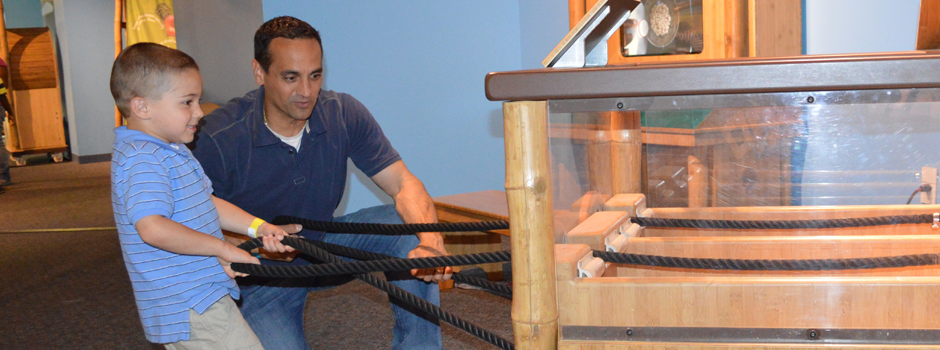Growth & Development: 3-5 Years
As your child grows into early childhood, his world will begin to open up. He will become more independent and will pay extra attention to adults and children outside of the family. He will want to explore his surroundings and will have lots of questions to ask. His interactions with family and those around him will help to shape his personality and individual ways of thinking and moving.*
How to Support Your Child's Learning Process
Continue to read to your child. Nurture her love for books by taking her to the library or bookstore.
Let your child help with simple chores.
Support your child's language develop by speaking to her in complete sentences and in “adult” language. Help her to use zhe correct words and phrases.
Be clear and consistent when disciplining your child. Model the behavior that you expect.
Developmental Milestones
Children develop at their own paces. These developmental milestones are meant to give you a general idea of the changes you can expect in the areas listed below when your child is between three and five years. Remember - there is a range of development that is considered “typical” for children. If you ever have questions regarding your child's skills, please contact your pediatrician.
Social and Emotional Development
- Shares toys
- Follows a series of simple directions
- Shows some understanding of right and wrong
- Compares themselves to others
- Develops friendships and interacts with other children
- Engages in pretend play
Physical Development
Three to Four Years
- Runs around obstacles
- Balances on one foot
- Pushes, pulls, and steers toys
- Throws and catches a ball
- Builds a tower of blocks
- Manipulates clay
- Can dress and undress self
Four to Five Years
- Draws crosses and circles
- Walks backwards
- Jumps forwards many times
- Walks up and down stairs
- Somersaults
- Uses safety scissors
- Cuts on line continuously
- Copies squares and crosses
- Prints a few capital letters
- Draws a person
Cognitive Development
- Groups and matches objects
- Organizes materials
- Asks “why” and “how” questions
- Tells their own name and age
- Attends to activities for longer periods of time
- Learns by observing and listening
- Shows awareness of past and present
- Follows a series of two to four directions
- Plays with words
- Points to and names colors
- Understands order and process
- Counts to five
- Is able to tell someone street and town
Speech & Language Development
Three to Four Years
- Talks about activities at school or friends' homes
- Speaks clearly enough that unfamiliar listeners can understand most oftheir speech
- Uses many sentences that have more than four words
- Understands simple questions
Four to Five Years
- Speech is 90-100% intelligible to everyone
- Uses sentences that give lots of detail
- Tells stories that stick to a topic
- Might have some articulation errors
- Can answer simple questions about a story
Sexual Development
(Adapted from kidshealth.org)
By preschool, most kids have developed a strong sense of being a boy or girl, and continue to explore their bodies even more purposefully. Since preschoolers are old enough to understand that some things are not meant to be public, you may want to explain that even though it feels good, touching should be done in private. Scolding them when they touch themselves will only prompt a sense of guilt and shame. They're also old enough to understand that no one — not even family members or other people they trust — should ever touch them in a way that feels uncomfortable. Your preschooler will continue to learn important sexual attitudes from you — from how you react to people of the opposite sex to how you feel about nudity.
As kids become curious about everything, it's common for preschoolers to pose questions to their parents like "Where do babies come from?" or "Why doesn't my sister have a penis?" When you get questions like these, try to answer as honestly and matter-of-factly as possible. Find out exactly what your child wants to know and then answer the specific question — there's no need to go into elaborate detail when it might not be necessary. For example, you might say that a man and woman can make a baby and that the baby grows inside the woman's belly. If this satisfies your child, you might not need to provide additional information about how the baby is actually made until later.
At this stage, kids tend to be curious not only about their own bodies, but about others' too. If you find your preschooler playing doctor with another child around the same age, it's important not to overreact — to them it's just an innocent game (of course, if an older child or adult is involved, your concern would be legitimate). Calmly ask your child to get dressed and distract him or her with a toy or game. You may want to take this as a clue that your child is curious about the body, and facilitate learning about it in some other way, like a children's book on the subject that's geared to preschoolers.
Some parents of preschoolers are alarmed when they hear their kids talk about a boyfriend or girlfriend. If your youngster says this, remember that kids don't attach the same meanings to the word that adults do. Most experts agree that it's best to react to this kind of news in a neutral way — don't encourage the behavior, but don't express concern either.
*This article appears courtesy of onetoughjob.org - a parenting website owned and operated by The Children's Trust.
See Programs and Activities for preschoolers in Somerville, MA.




